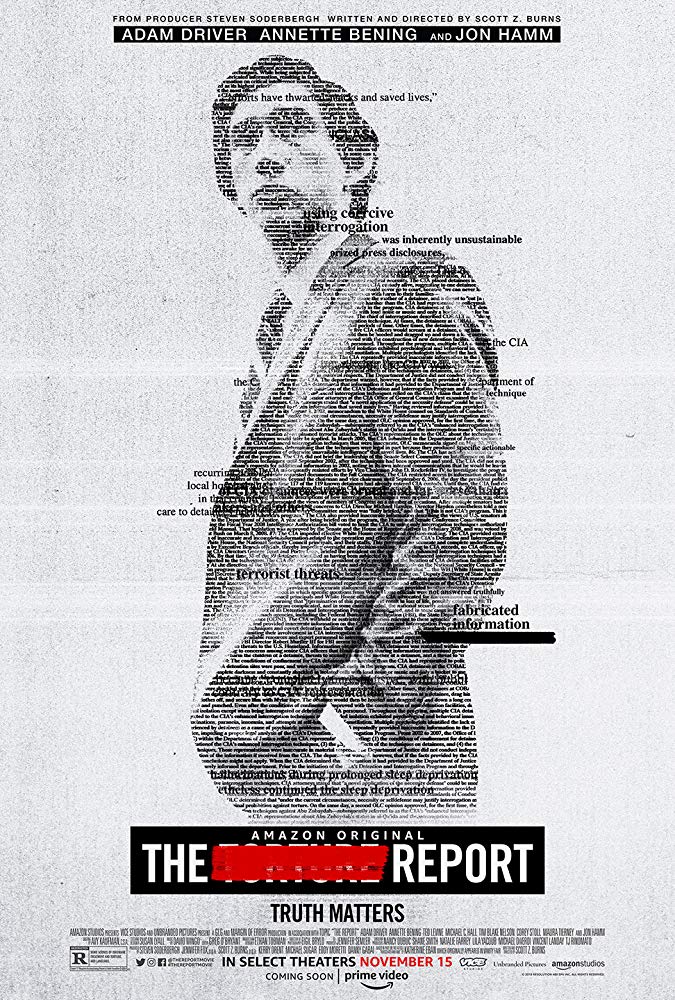A review of a film from the British Film Institute’s London Film Festival 2019 – The Report – the story of one man’s fight to call the American government to task for their complicity in torture, post 9/11.

The Report
Screening Date – Sunday, 6th October 2019
One of my particular interests, as a current Forensic Psychology student and as an ex-PIP level 2/ABE interviewer, is in tackling the myth that torture is ever warranted. In case Jack Bauer and 24 have warped your mind into believing that it can ever be justified, you should know that, as an interrogation technique, torture is one of the least efficacious. As this film amply demonstrates, those being tortured will say anything, just to make the pain stop. This, alone, renders it a faulty instrument for uncovering truth.
Effective interrogation is about establishing rapport – whatever your personal feelings towards the person you are questioning, the trick is to befriend the person across the table, not to alienate them. Despite what its proponents would have you believe, torture has not been demonstrated to have thwarted a single terrorist attack and it did not lead to information that found Osama bin Laden. It’s recent use by American authorities, however, did ruin lives, jeopardise trials and forever taint a nation.
The Report centres on Daniel Jones (Adam Driver), a United States Senate investigator, tasked with uncovering the truth about the enhanced interrogation programme. At this point, you might, as I did, have concerns that a film which concentrates on Jones writing a report in a windowless concrete room would get a bit dull but it is testament to the director’s skill and to Driver’s acting that it is thrilling. You might also find yourself punching the air at Jones’ small moments of triumph.
The CIA’s green light for torture, following 9/11, was extraordinary. How far their decision was about revenge, proceeding from their guilt and embarrassment over failing to stop the biggest ever terrorist attack on American soil, is open to question. It is clear, however, that many powerful people would have preferred the military’s ‘Enhanced Interrogation Techniques’ programme to have remained a secret. In the film, it quickly becomes evident that Jones and the report’s commissioner, Senator Dianne Feinstein (Annette Bening), have a fight on their hands to expose the CIA’s misdeeds, as overt threats and political manoeuvres threaten to derail their quest on several occasions.

Director Scott Z Burns (screenwriter of Contagion, The Bourne Ultimatum and the upcoming Bond film, No Time To Die) liberally references a couple of my favourite Redford-starring political thrillers of the 1970s, All The President’s Men and Three Days of the Condor. His film shows how vital it is that a nation confront its misdeeds and increase protections to ensure it never happens again. [Admittedly, this feels a little unlikely in a world in which Trump has said, ‘torture works’ and that he would bring back, ‘a hell of a lot worse than waterboarding’].
In the film, I, personally, found two characters particularly reprehensible – the two psychologists who made 80 million dollars in selling (and, in several cases, personally executing) their ‘enhanced interrogation’ programme. Cobbling together techniques from the Air Force’s ‘Survival Evasion Resistance Escape’ (SERE) manual and half-baked ideas stolen from the work of the psychologist, Martin Seligman, about ‘learned helplessness’, they sold a series of vile techniques to the CIA as legitimate tools, despite neither man having conducted an interrogation before in his life.
One of the closing scenes of the film is of these two psychologists laughing and swilling champagne in their private jet. I hope you will feel as outraged as I did. Granted immunity from prosecution in their deal with the CIA, these two hustlers did not even receive censure from the American Psychological Association (APA). Perhaps psychologists need to consider beefing up their ethical guidelines?
Britain’s own complicity in the ‘extraordinary rendition’ of suspects means that we should not be too quick in our condemnation of America. British Psychology appears to offer no better protection than the APA. Indeed, The Guardian reported that, ‘The position of the British Psychological Society is even less clear (than the APA). On the one hand the Society condemns torture yet at the same time remains silent on whether psychologists can assist with interrogation or other military objectives’ (Chris Chambers, 05 Nov 2013).
Of course, we might never have been debating these issues without a few brave individuals. Thankfully, there were people like Daniel Jones who were willing to risk their lives and careers to get the truth out. He received a much-deserved standing ovation at the London Film Festival, when he made a surprise appearance after the screening.
[Incidentally, another official who has refused to remain silent on this topic is Mark Fallon (ex-NCIS Deputy Assistant Director for Counterterrorism). I reviewed his excellent book on the American practice of torture, Unjustifiable Means, here].
The Report is a timely reminder that, despite international treaties and protocols, the effectiveness of torture is still misinterpreted and can all too easily be re-implemented, even by the most civilised of nations.
Dir-Scr Scott Z Burns
Prod Steven Soderbergh, Jennifer Fox, Scott Z Burns, Kerry Orent, Michael Sugar, Eddy Moretti, Danny Gabai
With Adam Driver, Annette Bening, Jon Hamm
USA
2019
120min
UK Distribution Curzon

